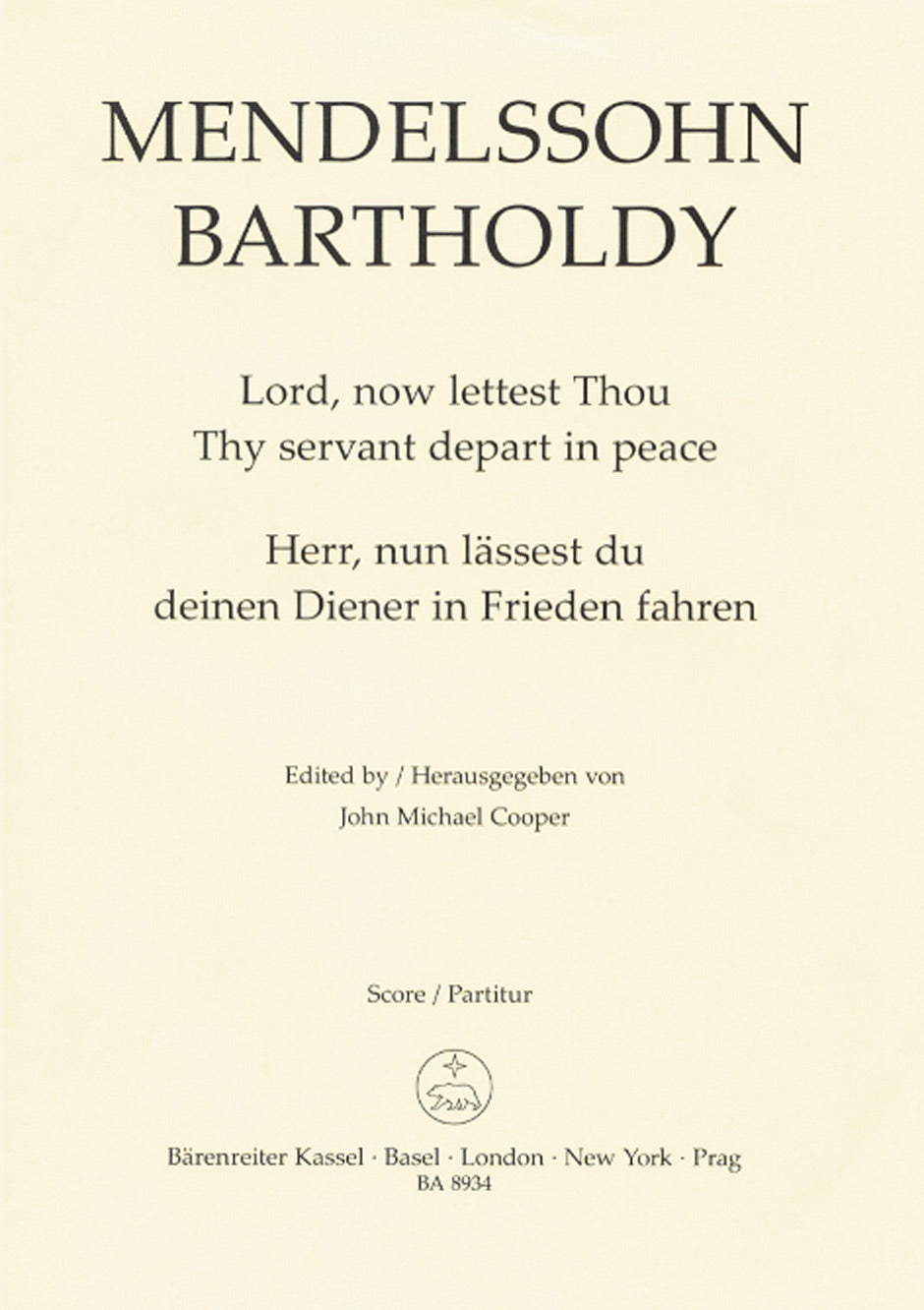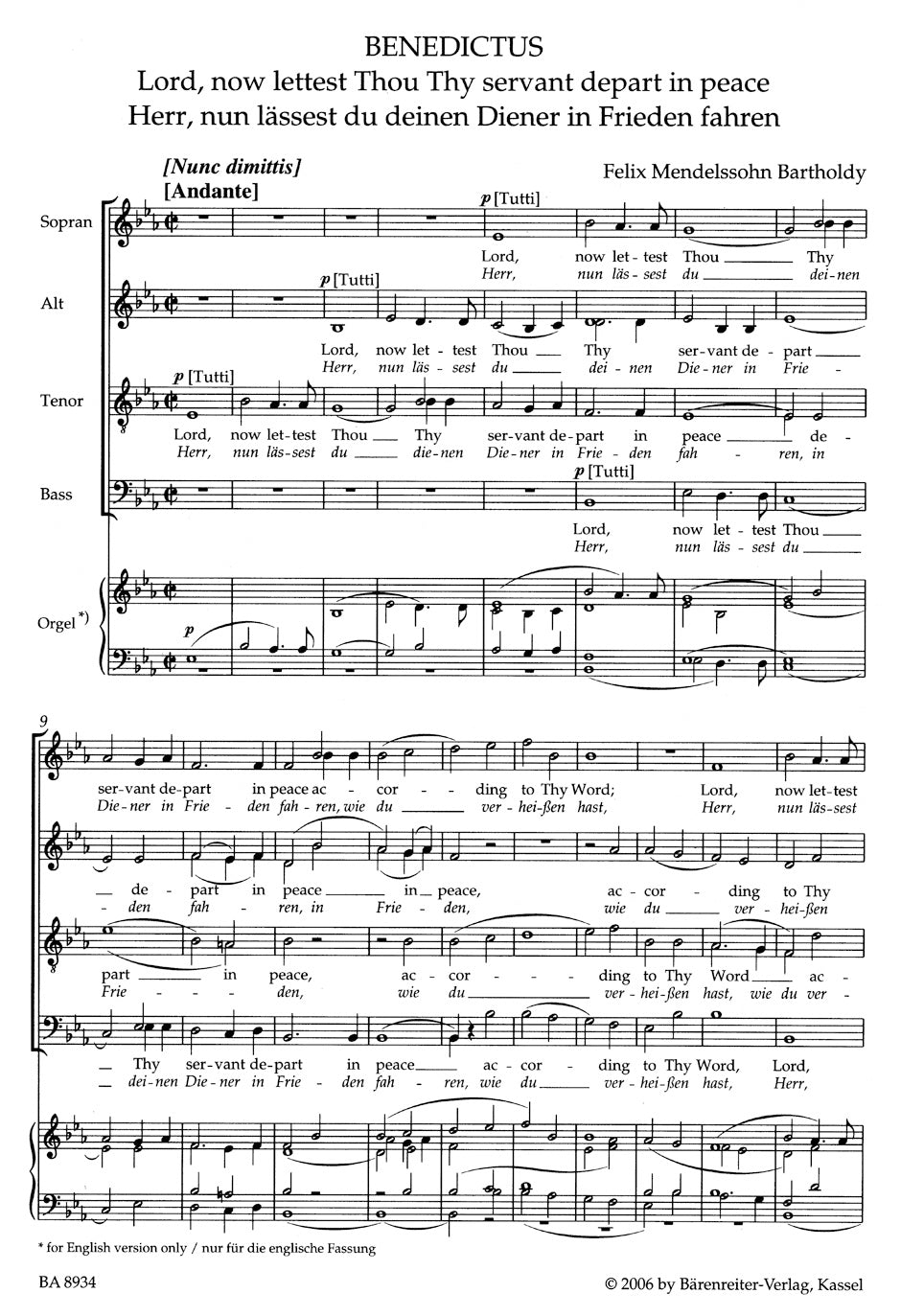Mendelssohn: Herr, nun lässest du deinen Diener in Frieden fahren, MWV B 60, Op. 69
Expected to ship in about a week.
Minimum Order Qty: 10
- Composer: Felix Mendelssohn (1809-1847)
- Editor: John Michael Cooper
- Instrumentation: SATB Choir
- Work: Herr, nun lässest du deinen Diener in Frieden fahren, MWV B 59, Op. 69, No. 3
- ISMN:
- Size: 7.5 x 10.6 inches
- Pages: 11
Description
Mendelssohn's Three Motets, op. 69, and Three Psalm Settings, op. 78, belong to the standard repertoire of many choruses and vocal ensembles. Our editions, the work of two leading Mendelssohn specialists, Hiromi Hoshino and Michael Cooper, present these pieces in separate volumes reflecting the latest state of scholarly research. We also offer a separate edition of Psalm 91, "For He shall give His angels charge", in its original setting for eight-part a cappella chorus. (Mendelssohn later incorporated it into "Elijah" with an orchestral accompaniment). Each edition contains the original German text and the English translation authorized by the composer himself. A two-stave reduction of the vocal parts has been added as an aid in rehearsal. Complete editions are available with critical reports and introductions in German and English. - Urtext at the forefront of musical scholarship - Complete editions with critical reports and introductions in German and English - With piano reductions for rehearsal purposes
Publishers use a lot of words to describe what they sell, and we know it can be confusing. We've tried to be as clear as possible to make sure you get exactly what you are looking for. Below are descriptions of the terms that we use to describe the various formats that music often comes in.
Choral Score
A score for vocalists that only contains the vocal lines. The instrumental parts are not there for reference. Generally, cheaper than a vocal score and requires multiple copies for purchase.
Facsimile
Reproductions of the original hand-written scores from the composer.
Full Score
For ensemble music, this indicates that the edition contains all parts on a single system (there are not separate parts for each player). In larger ensembles, this is for the conductor.
Hardcover
Hardbound. Generally either linen-covered or half-leather.
Orchestral Parts
Similar to a wind set, this is a collection of parts. In the case of strings, the numbers listed are the number of copies included, though generally these are available individually (often with minimum quantities required).
Paperback
When publishers offer multiple bindings (e.g. hardcover) or study scores, this is the "standard" version. If you're planning to play the music, this is probably what you want.
Performance / Playing Score
A score of the music containing all parts on one system, intended for players to share. There are not separate parts for each player.
Set of Parts
For ensemble music, this indicates that there are separate individual parts for each player.
Solo Part with Piano Reduction
For solo pieces with orchestra, this is a version that contains a piano reduction of the orchestra parts. For piano pieces, two copies are typically needed for performance.
Study Score
A small (think choral size) copy of the complete score meant for studying, and not playing. They make great add-ons when learning concertos and small chamber works.
Vocal Score
A score prepared for vocalists that includes the piano/organ part or a reduction of the instrumental parts.
Wind Set
For orchestral music, this is a collection of wind and percussion parts. The specific quantities of each instrument are notated.
With Audio
In addition to the printed music, the edition contains recordings of the pieces. This may be an included CD, or access to files on the internet.
With / Without Fingering (Markings)
Some publishers prepare two copies - a pure Urtext edition that includes no fingering (or bowing) suggestions and a lightly edited version that includes a minimal number of editorial markings.




